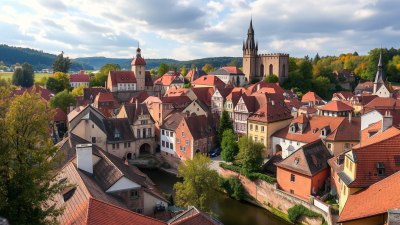The Surprising Ways History and Travel Are Connected
Discover the fascinating connections between history and travel and how they shape our understanding of the world.

History and travel are intricately intertwined, with each influencing the other in profound ways. The act of traveling is not merely about moving from one location to another; it is deeply rooted in historical contexts, cultural exchanges, and the evolution of societies. This article delves into the captivating connections between history and travel, exploring the surprising ways they are linked throughout time.
The Evolution of Travel Through History
The journey of travel has undergone significant transformations over the centuries. In ancient times, travel was primarily motivated by trade, conquest, or exploration. The Silk Road, which connected East and West, serves as a prime example of how travel facilitated not only the exchange of goods but also cultural ideas and philosophies. Merchants and traders traveling these routes played a crucial role in shaping the historical narratives of civilizations.
During the age of exploration in the 15th and 16th centuries, travel took on new dimensions as European explorers ventured into uncharted territories. Figures like Christopher Columbus and Ferdinand Magellan not only expanded geographical knowledge but also initiated complex interactions that led to both cultural exchanges and conflicts. The consequences of these travels are felt to this day, as they significantly impacted the course of history and paved the way for modern globalization.
Travel as a Catalyst for Historical Understanding
Travel has always been a vital means of gaining insight into the past. Visiting historical sites, museums, and landmarks allows travelers to connect with the stories of those who came before. For instance, standing before the pyramids of Egypt or wandering through the ruins of ancient Rome provides a tangible experience that enhances our understanding of historical narratives.
Moreover, travel enables individuals to appreciate the diversity of cultures and the historical contexts that shape them. By engaging with local customs, traditions, and histories, travelers can gain a deeper appreciation for how history has molded societies and their identities. This understanding fosters empathy and respect for different cultures, ultimately promoting global harmony.
The Impact of War on Travel
War has always influenced travel, often determining the routes people take, the destinations they choose, and even the very nature of travel itself. Throughout history, conflicts have redirected trade routes, leading to new pathways for travel. For example, during World War II, wartime restrictions significantly altered travel patterns in Europe and beyond.
Moreover, war has given rise to a form of travel that centers around remembrance and education. Many individuals and groups visit battlefields, memorials, and museums to pay homage to those who fought and to learn from the past. This kind of travel not only educates travelers but also serves as a powerful reminder of the consequences of conflict and the importance of peace.
Cultural Exchanges and Their Historical Significance
Throughout history, travel has facilitated cultural exchanges that have enriched societies. As people move from one place to another, they bring their customs, beliefs, and practices, leading to a dynamic interplay of cultures. The spread of ideas, languages, and artistic expressions through travel has profoundly impacted history.
For instance, the movement of scholars during the Islamic Golden Age saw the translation of Greek and Roman texts, fostering a resurgence of knowledge in Europe during the Renaissance. Such cultural exchanges illustrate how travel can act as a conduit for intellectual growth and societal advancement.
The Role of Pilgrimages in Historical Travel
Pilgrimages have long been an integral part of travel, offering insight into the spiritual and historical dimensions of cultures. Throughout history, various religions have encouraged their followers to embark on journeys to sacred sites, creating a rich tapestry of travel motivated by faith.
For example, the Camino de Santiago in Spain has drawn pilgrims for centuries, with each journey contributing to a larger historical narrative of spirituality and community. These pilgrimages not only offer personal transformation for the traveler but also highlight the historical significance of shared beliefs and practices across cultures.
Travel Literature: A Window into History
Travel literature serves as a significant intersection between history and travel, providing insights into the experiences of travelers throughout various epochs. The writings of explorers, travelers, and adventurers offer unique perspectives on the world as it was, reflecting the cultural, social, and political contexts of their time.
From the works of Marco Polo to contemporary travel bloggers, these narratives not only document the act of travel but also serve as historical accounts that capture the essence of different societies. They allow us to glimpse how travel has evolved and how historical events have influenced the way people engage with the world.
Nostalgia and Memory in Travel
Nostalgia plays a vital role in the travel experience, often rooted in historical connections. Many individuals travel to revisit places from their past, whether as a means of reconnecting with cultural heritage or simply as a way to relive cherished memories. This nostalgia ties personal experiences to broader historical contexts, highlighting how individual stories contribute to collective histories.
Furthermore, the reconnection with history through travel can lead to a deeper understanding of one’s identity and place within the tapestry of human experiences. Each journey can serve as a reminder of the rich history that shapes contemporary society, reinforcing the connection between the past and the present.
Modern Travel and Historical Consciousness
In today's fast-paced world, modern travel continues to be influenced by historical consciousness. The rise of heritage tourism, where travelers seek to explore their roots or learn about the history of a location, underscores the importance of understanding the past. People increasingly prioritize authentic experiences that allow them to engage with history, whether through guided tours of historical sites or immersive cultural exchanges.
Moreover, technological advancements have provided new avenues for exploring history. Virtual reality experiences, online exhibits, and digital archives have revolutionized how travelers access historical information, creating opportunities for greater understanding and appreciation of global history.
The Future of Travel and History
As we look ahead, the relationship between travel and history will continue to evolve. Sustainable travel practices are gaining traction, prompting individuals to consider the impact of their journeys on both local communities and historical sites. This shift reflects a growing awareness of the importance of preserving cultural heritage for future generations.
Additionally, as we navigate an increasingly interconnected and diverse world, travel will play a crucial role in fostering global dialogue and understanding. By immersing ourselves in different cultures and histories, we can create a more harmonious global community that values the rich tapestry of human experiences.
In conclusion, the connection between history and travel is both profound and multi-faceted. From the evolution of travel through the ages to the ways in which cultural exchanges shape societies, history has intricately woven its narrative into the fabric of travel. Understanding this relationship enhances our journeys, allowing us to appreciate not only the destinations we visit but also the historical stories that have shaped them. As we embark on our travels, let us remain mindful of the past, embracing the rich histories that continue to influence our world today and into the future.











